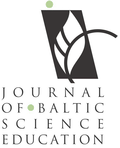LEARNING STYLES OF A STORY ABOUT SUSTAINABILITY: THEIR EFFECT ON THE LEVEL OF QUESTIONING OF STUDENTS IN PRIMARY EDUCATION
| Title | LEARNING STYLES OF A STORY ABOUT SUSTAINABILITY: THEIR EFFECT ON THE LEVEL OF QUESTIONING OF STUDENTS IN PRIMARY EDUCATION |
| Publication Type | Journal Article |
| Year of Publication | 2023 |
| Authors | Asli, S, Safi, Z, Shehadeh-Nasser, A, Hofstein, A, Hugerat, M |
| Journal | Journal of Baltic Science Education |
| Volume | 22 |
| Issue | 6 |
| Start Page | 1011-1024 |
| Pagination | Continuous |
| Date Published | December/2023 |
| Type of Article | Original article |
| ISSN | 1648-3898 |
| Other Numbers | E-ISSN 2538-7138 |
| Keywords | asking questions, science story, storytelling, sustainability education, text learning |
| Abstract | The use of stories in science education can make science more interesting and engaging, illustrate concepts, and provide opportunities for contextual and meaningful learning. Also, integrating a scientific story in which the sustainability goals are incorporated can lead to increasing students’ motivation to learn as well as improve and facilitate the learning process. Having children ask questions allows the educator to learn about the child's insights, views, level of interest, motivation for learning, and knowledge. Therefore, this study focuses on the relationship between science storytelling, questioning, and sustainability among elementary school students. It compares the levels of questioning among primary students who learned a sustainability story in segments versus those who learned the story in its entirety. A quantitative study was conducted involving 120 second graders from the Arab sector in Israel. The results revealed a significant difference in the two groups’ level of questions: the students in the experimental group, who learned the story in segments, asked higher-level questions than those in the control group. The study concluded that learning a scientific story in segments proved effective in enhancing primary students' questioning ability, and that there was a notable preference for this segmented storytelling approach over traditional whole unit learning methods. |
| URL | https://oaji.net/articles/2023/987-1702728842.pdf |
| DOI | 10.33225/jbse/23.22.1011 |
| Refereed Designation | Refereed |
| Full Text |
